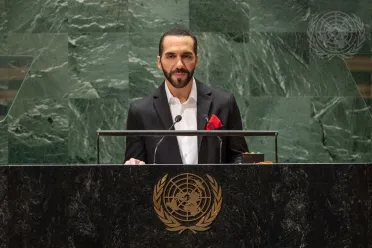Statement
Statement summary
NAYIB ARMANDO BUKELE, President of El Salvador, called for the need to “renew and reinvent ourselves”, not only the United Nations, but also all countries. El Salvador, like other developing countries, has always dreamed of being great. For some countries, it was always something unthinkable. No one listening would have thought of El Salvador as a global benchmark or positive example, but despite all the stumbling blocks, the country decided to take the risk and did not accept the fate that others decided for it. Four years since his Government took office, he declared, nobody would dare to deny that the continent’s smallest country would make such strides forward in achieving greatness — for the first time in its 202-year history.
In such a short time, he proclaimed, El Salvador went from being the world’s murder capital and most dangerous country to becoming the safest country in Latin America. “This isn’t a promise anymore, it’s the reality that Salvadoran people are living through, and anyone from abroad is welcome to see it for themselves.” Other countries, including in Latin America and the United States, are watching and wondering why they cannot do the same thing, he added. The answer is clear and simple: Countries must make their own decisions, reaffirm their rights to use common sense, try their own methods, implement their own plans and design their own systems. “No country has the right to impose its ideas, its way of doing things — even less when these things don’t work in our countries.” El Salvador reaffirmed its legitimate right to govern itself.
There is not one single recipe or formula that works for everyone, but there is one ingredient that every recipe should include: courage. That is, the right attitude, guts, and determination to do what needs to be done even when others criticize or question it. For decades, he recounted, “we tried everything that we were told was the right thing for us and it got us fighting a civil war for things far removed from us.” The conflict between the West and then Soviet Union was being waged in El Salvador. With more than 85,000 people dead and one destroyed country later, he said, “they told us that it was not the right recipe, but there was a new recipe available. They made us sign up for some fake peace agreements, but there was no peace in them, and they only enabled two different gangs to plunder the loot.” Under foreign Powers, the country went to the right and left, resulting in more deaths and poverty after the war than during it. Nobody did anything to change the system’s root causes, institutions, or laws.
Everything was done with the “support, consent, and imposition of those who proclaimed themselves to be the great defenders of human rights and democratic institutions”. Rather than giving us medicine to make us better, he emphasized, what they were giving us was poison. However, for the first time, El Salvador tried its own remedy. Ensuring “we had God and the people on board” and not obeying external powers, his government purged the judiciary and prison system and changed laws to prevent terrorists from escaping prison. International condemnation then started from countries, media outlets, and so-called experts that “never used their power or influence to call for security for our people being murdered.” El Salvador now competes with Canada to be the continent’s safest country, he declared, as the Latin American nation with the least homicides per capita. Now a “benchmark for security,” El Salvador is an example of what all countries can achieve when they start to claim their sovereignty, he said.
Full statement
Read the full statement, in PDF format.
Photo

Previous sessions
Access the statements from previous sessions.
